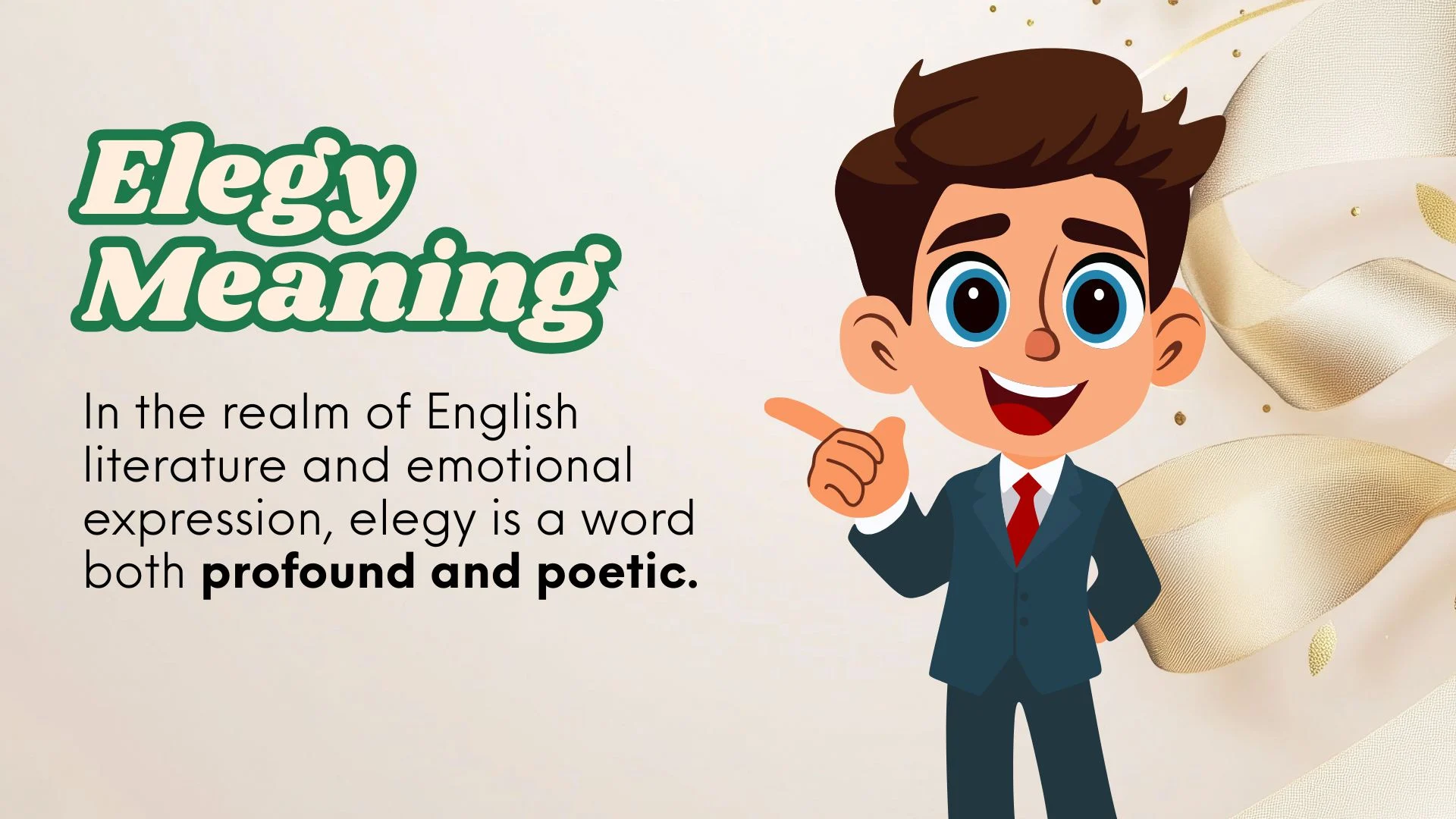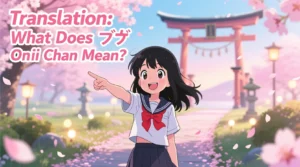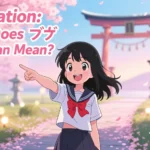In the realm of English literature and emotional expression, elegy is a word both profound and poetic.
More than just a definition in a dictionary, the term carries with it the weight of loss, beauty of memory, and depth of human reflection.
In this article, we’ll explore the meaning of elegy, how it’s used in various contexts, and offer synonyms and examples that can elevate your vocabulary, writing, or speech to a new level in 2025.
🕊️ What Is the Meaning of Elegy?
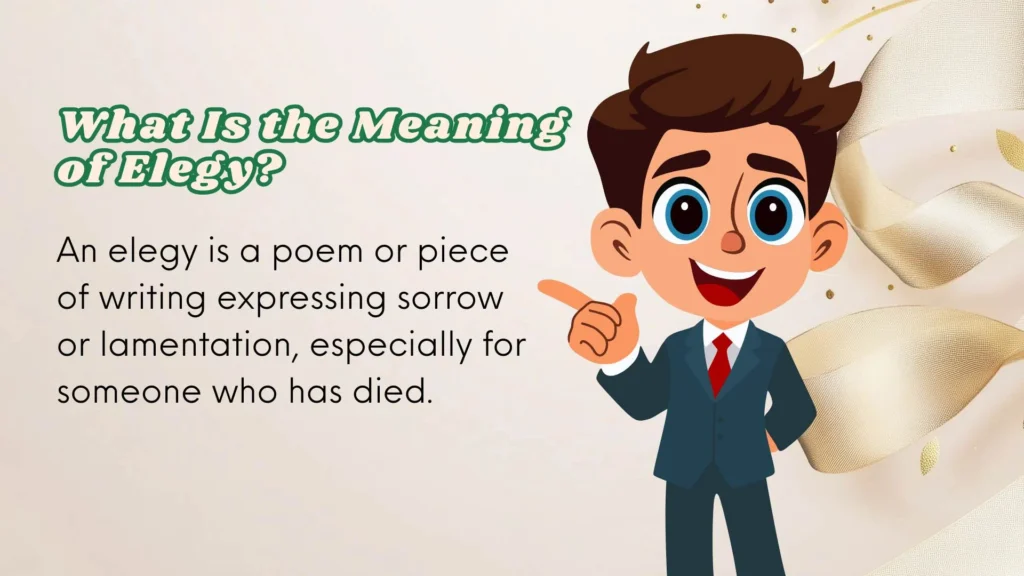
An elegy is a poem or piece of writing expressing sorrow or lamentation, especially for someone who has died.
Traditionally, elegies are reflective, emotional, and often explore themes of grief, loss, mortality, and the passage of time.
Unlike other forms of poetry, an elegy is not defined by its structure but by its tone and purpose. It isn’t always bound to rhyme or meter. Instead, it seeks to express personal emotions—often in the most graceful and heartfelt ways.
Definition (2025 Update):
Elegy — a mournful, melancholic, or reflective literary work or poem written in memory of someone deceased or expressing sorrow for an irretrievable loss.
🧠 Etymology: Where Does the Word “Elegy” Come From?
The word elegy originates from the Greek word “elegeia”, meaning a poem of mourning or lamentation.
Over time, Latin adapted it as elegia, which eventually entered the English lexicon in the 16th century. Initially, it described poems of serious or somber nature, often written in elegiac couplets.
In 2025, the word has transcended poetry and is used metaphorically in modern media, literature, social commentary, and even digital spaces—such as blog posts, obituaries, and reflective essays.
📚 Synonyms of Elegy (Advanced-Level)
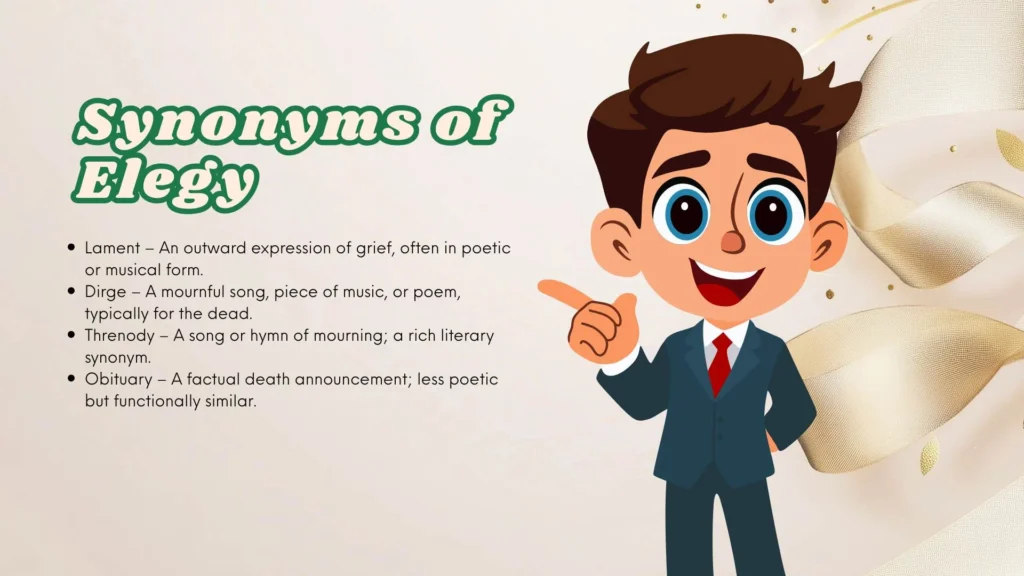
While no word perfectly mirrors the emotional complexity of elegy, several terms come close. Depending on your tone and context, the following can serve as elegant replacements:
- Lament – An outward expression of grief, often in poetic or musical form.
- Dirge – A mournful song, piece of music, or poem, typically for the dead.
- Threnody – A song or hymn of mourning; a rich literary synonym.
- Obituary – A factual death announcement; less poetic but functionally similar.
- Monody – A poem lamenting a person’s death delivered by a single voice.
- Funeral Ode – A specific poem written in tribute at funerals.
- Tribute – A speech or piece of writing honoring the deceased.
- Requiem – A mass or musical composition for the dead.
- Eulogy – A spoken or written praise, usually given at funerals.
- Memorial Verse – A sentimental poem included in memorials or epitaphs.
Elegy Meaning in English ✍️
In English, an elegy is a poem or literary work written as an expression of sorrow, typically for someone who has died.
It can also refer to any reflective piece that mourns a loss—whether it’s a person, place, way of life, or time. It usually carries a serious, mournful tone and evokes deep emotions.
Hillbilly Elegy Meaning of Title 🏔️
The title Hillbilly Elegy carries symbolic weight. “Hillbilly” identifies a group of people from rural Appalachia, often stereotyped or misunderstood.
“Elegy” adds emotional depth, indicating that the book is not just a story—it’s a farewell or a lament.
Together, the title suggests the decline or transformation of the Appalachian lifestyle and a personal reflection on the author’s family history.
Elegy Meaning in Literature 📖
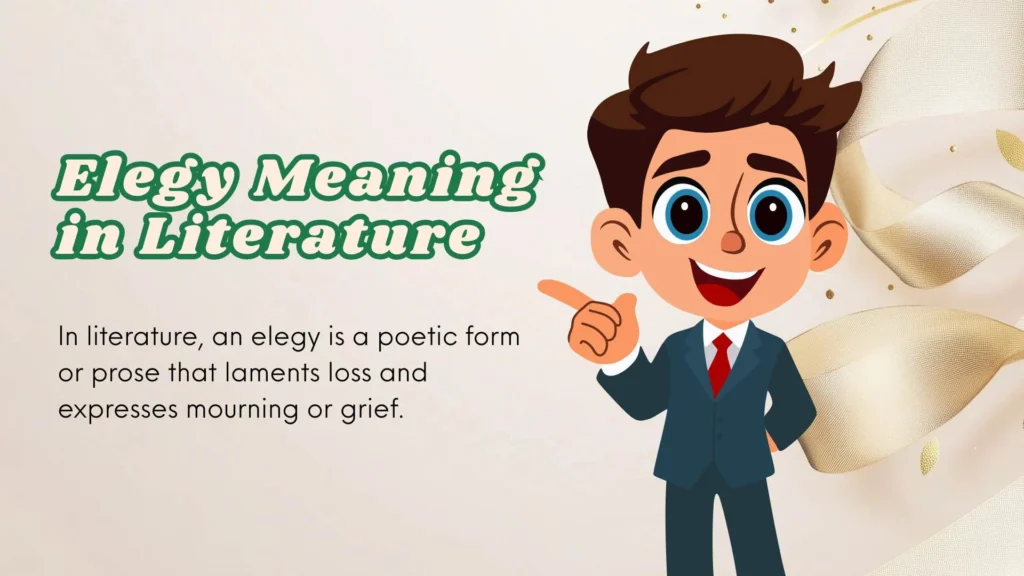
In literature, an elegy is a poetic form or prose that laments loss and expresses mourning or grief.
Some of the most famous elegies come from poets like Thomas Gray (“Elegy Written in a Country Churchyard”) or W.H. Auden (“Funeral Blues”).
Literary elegies often follow a specific structure: they start with sorrow, reflect on the loss, and end with consolation.
Elegy Meaning in Hillbilly Elegy 💭
In Hillbilly Elegy, the word “elegy” doesn’t refer to a literal poem. Instead, it symbolizes the emotional tone of the memoir. J.D.
Vance is mourning the decline of the culture he grew up in—one marked by community and resilience but also by hardship and decay.
The memoir acts as an elegy for a lifestyle and identity that is changing or disappearing.
Elegy Meaning and Examples 📝
Here are a few quick examples of elegy to better understand the term:
- Poetry Example: “O Captain! My Captain!” by Walt Whitman is an elegy for President Abraham Lincoln.
- Prose Example: Hillbilly Elegy is a memoir, but it functions as an elegy for a struggling culture.
- Modern Usage: Tributes shared on social media after a tragedy can also be considered modern forms of elegies.
- Music: Songs like Eric Clapton’s “Tears in Heaven” are lyrical elegies about loss.
- Film/Documentary: Movies that reflect on fading traditions or cultures often carry elegiac themes.
Elegy Meaning in Poetry 📝
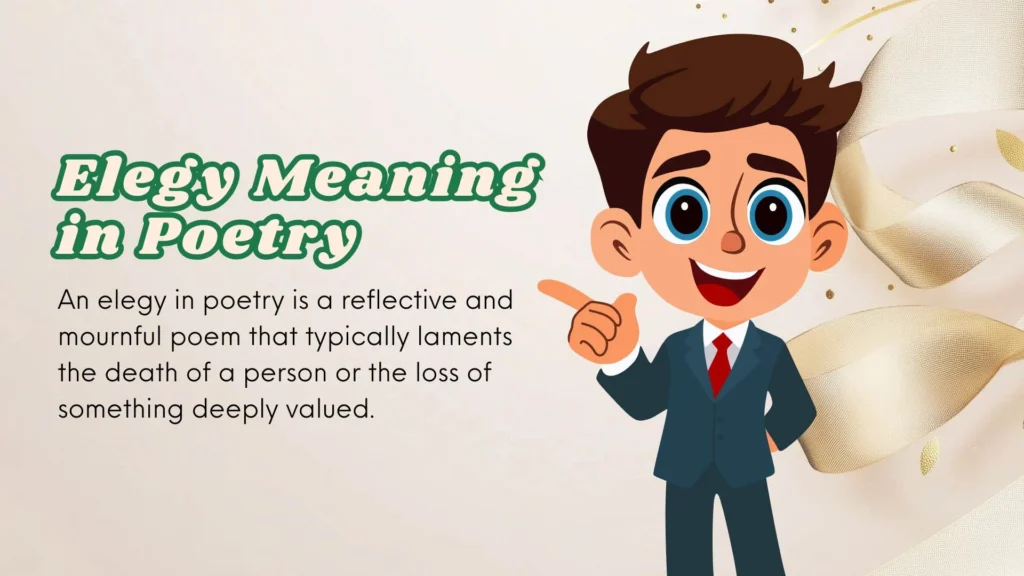
An elegy in poetry is a reflective and mournful poem that typically laments the death of a person or the loss of something deeply valued. Unlike a simple sad poem, an elegy follows a formal structure and often moves through three stages: grief, praise of the deceased, and consolation. Classic examples include Thomas Gray’s “Elegy Written in a Country Churchyard” and Walt Whitman’s “When Lilacs Last in the Dooryard Bloom’d.” Elegies aren’t just sad—they explore the deep emotional responses we have to loss and mortality.
Hillbilly Elegy Meaning of Title Summary 📚
The title Hillbilly Elegy is both symbolic and personal. “Hillbilly” refers to the Appalachian identity of the author’s family, while “elegy” implies a mourning for a dying culture or way of life. J.D. Vance uses this title to highlight the struggles of white, working-class Americans from the Rust Belt. It’s not just a memoir—it’s a cultural eulogy for a community facing decline. The book explores how poverty, trauma, and social decay have shaped a forgotten population in modern America.
Hillbilly Elegy Meaning in English 🇺🇸
In plain English, Hillbilly Elegy means a lament or tribute to the “hillbilly” culture—typically rural, white, working-class people from Appalachia. The book portrays their challenges, family dynamics, and generational struggles. It’s about a community’s downfall and survival, told through the lens of someone who lived it and eventually escaped it. The title emphasizes the emotional and societal farewell to a fading American identity.
Eulogy vs Elegy Meaning ⚖️
While they sound similar, a eulogy and an elegy serve different purposes.
- A eulogy is a spoken or written tribute, usually delivered at a funeral, praising the deceased. It focuses on their life, achievements, and memories.
- An elegy, on the other hand, is a poetic expression of sorrow and loss. It’s more artistic, often melancholic, and doesn’t always have to be about a person—it can mourn a lost era or homeland.
In short: Eulogy = praise, usually a speech; Elegy = poetry, usually mournful.
Elegy Meaning vs Eulogy 📖
To put it simply:
- Elegy = a poem of mourning.
- Eulogy = a speech or tribute.
Both deal with death, but the form and function differ. An elegy leans toward literary expression and reflection. A eulogy focuses more on sharing fond memories and honoring someone’s legacy. Think of a eulogy as something spoken at a memorial service, while an elegy might be read in a book of poetry.
Pastoral Elegy Meaning 🌾
A pastoral elegy is a special kind of elegy that uses rural, nature-based imagery to mourn a loss—often the death of a poet or artist. It typically imagines the deceased as a shepherd and includes symbolic references to the countryside, shepherds, and nature mourning the loss.
Famous example? Milton’s “Lycidas”, where he laments the death of a friend using Greek pastoral traditions. These elegies are peaceful yet profound, blending natural beauty with human sorrow.
🎭 Elegy in Literature: Timeless and Universal
From ancient texts to 2025’s most intimate spoken word poetry, elegies endure. Some of the most moving elegies in history were written not by famous poets but by everyday people processing unimaginable loss.
Famous Examples:
- “Lycidas” by John Milton – mourning a friend lost at sea.
- “In Memoriam A.H.H.” by Alfred, Lord Tennyson – a tribute to a dear friend.
- W.H. Auden’s “Funeral Blues” – emotionally potent and widely quoted today.
In modern literature, novels sometimes incorporate elegiac tones, especially when dealing with war, death, or historical loss. Writers use elegy-like passages to process trauma, explore collective memory, or celebrate what was once alive.
🎙️ Modern Usage of Elegy (2025 Perspective)
While elegy began as a poetic genre, in 2025, it’s also used to describe:
- Music: Many ambient or classical compositions are described as elegiac.
- Film: Movies with reflective, mournful themes are labeled as elegiac in tone.
- Art: Visual installations or photo essays themed around loss or time.
- Social Media: Posts paying tribute to loved ones often echo elegiac elements.
Example:
“Her final Instagram post felt like an elegy to the life she lived so passionately.”
Sugarplum Elegy Meaning 🍬🖋️
A “Sugarplum elegy” is a poetic or artistic expression that blends sweetness and sorrow. “Sugarplum” typically symbolizes childhood dreams, innocence, or fantasy. Combined with “elegy,” which is a mournful poem, it evokes a bittersweet remembrance — possibly of a lost childhood, an innocent time, or a dream that never came true.
Playground Elegy Meaning 🛝📜
“Playground elegy” refers to a nostalgic or mournful reflection on childhood or times spent in joyful innocence. It can symbolize the end of carefree days, growing up, or the passing of a simpler, happier time. It’s often used in literature or music to represent emotional transition.
Hillbillies Need No Elegy Meaning 🪕💬
The phrase “Hillbillies need no elegy” challenges the idea that rural or working-class communities need to be mourned or pitied. It implies that these communities are strong, self-sufficient, and not in need of outsider sympathy or poetic sorrow. It became popular after the book Hillbilly Elegy, as a critique or reinterpretation of its tone.
Poignant Elegy Meaning 💔📖
A “poignant elegy” is a deeply moving and emotionally touching poem or tribute to someone who has passed away. “Poignant” emphasizes the power of the elegy to stir emotions — particularly sadness, nostalgia, and empathy.
Allegorical Elegy Meaning 🎭🕯️
An “allegorical elegy” is a poetic work that mourns loss or death while also delivering a deeper symbolic or moral message. It goes beyond direct sorrow and uses metaphors or symbolic characters to reflect on bigger themes — like time, fate, justice, or society.
Elegy Meaning in Kannada 🗣️📘
In Kannada, the word “elegy” translates to:
ವಿಲಾಪ ಗೀತೆ (Vilāpa Gīte) — a sorrowful song or poem, typically written in memory of someone who has died.
Elegy Meaning in Telugu 🗣️📗
In Telugu, “elegy” is known as:
విలాప గీతం (Vilāpa Gītam) — which also means a lamenting or mourning poem written for the deceased.
🧾 Elegy vs. Eulogy – Don’t Confuse Them
Elegy and eulogy are often confused, but they serve different functions:
| Term | Function | Form | Emotion |
|---|---|---|---|
| Elegy | Literary or poetic tribute | Poem or lyrical prose | Deep sorrow, introspection |
| Eulogy | Spoken or written praise | Speech or paragraph | Respect, admiration, gratitude |
Think of an elegy as an emotional lens, while a eulogy is a spoken spotlight.
🧾 10 Beautiful Examples of Elegy in Sentences (New 2025 Format)
Here are freshly crafted examples to reflect how “elegy” is used across contexts—from poetry to personal narrative.
- The poet’s final work was a haunting elegy to his lost homeland, rich with imagery and sorrow.
- Under the autumn sky, she read a silent elegy to the man she once called home.
- Every brushstroke in his painting felt like an elegy to time forgotten.
- The documentary served as an elegy to a dying culture preserved only in memory.
- Her voice, raw and trembling, delivered an elegy that held the entire crowd in silence.
- He wrote a musical elegy—an instrumental goodbye echoing through empty hallways.
- That last photo album felt like an elegy, preserving fleeting joy in every frame.
- The abandoned town stood like an elegy carved in wood and dust.
- In his journal, every word was an elegy to the brother he never stopped mourning.
- Their old letters, bound together in a ribbon, became an elegy of a love that never healed.
📈 When to Use “Elegy” in Real Life
While “elegy” might sound too poetic for casual speech, knowing when and how to use it can make your communication richer, deeper, and more meaningful.
Here are moments when “elegy” fits perfectly:
- Writing or reading poetry
- Composing a reflective blog post
- Sharing a tribute on social media
- Crafting a memorial speech
- Discussing art, music, or cultural loss
- Writing fiction or personal essays
Avoid using it in light-hearted or informal contexts. It’s a word best reserved for emotionally significant reflections.
💬 Alternatives to “Elegy” Based on Tone
Here’s how to tailor your word choice depending on the emotional tone and audience:
🔹 Formal & Literary:
- Threnody
- Monody
- Requiem
Example: “The monody captured the nation’s grief after the tragedy.”
🔹 Academic:
- Mourning literature
- Elegiac discourse
Example: “This novel is best read as a piece of mourning literature.”
🔹 Poetic & Creative:
- Lamentation
- Funeral verse
- Elegiac reflection
Example: “Every chapter reads like an elegiac reflection on youth lost.”
🔹 Casual & Social Media Friendly:
- Tribute
- Farewell post
- Memory piece
Example: “Today’s post is a little tribute to someone I’ll never forget.”
💡 Why Knowing “Elegy” Matters in 2025
In the digital world, short attention spans rule, but meaning still matters. Using words like elegy shows not only emotional depth but linguistic sophistication.
Whether you’re:
- Writing content
- Posting a heartfelt message
- Sharing grief online
- Submitting a personal essay
—elevating your vocabulary with elegy makes your message more evocative, sincere, and memorable.
In a world saturated with generic phrases, the right word cuts through noise. Elegy is one such word.
🧠 Final Thought: An Elegy for Language Loss?
Here’s something to ponder in 2025: as AI-generated content floods the web and quick communication dominates our devices, the human tendency to express deep emotion—like through elegy—might begin to fade.

James Wilson is a puzzle aficionado with a flair for storytelling and a passion for problem-solving. His expertise in a wide range of puzzles, from crosswords to logic puzzles, shines through in his compelling and informative articles. James’ ability to make puzzling both fun and accessible makes him a beloved member of the Puzzlerpedia team.
